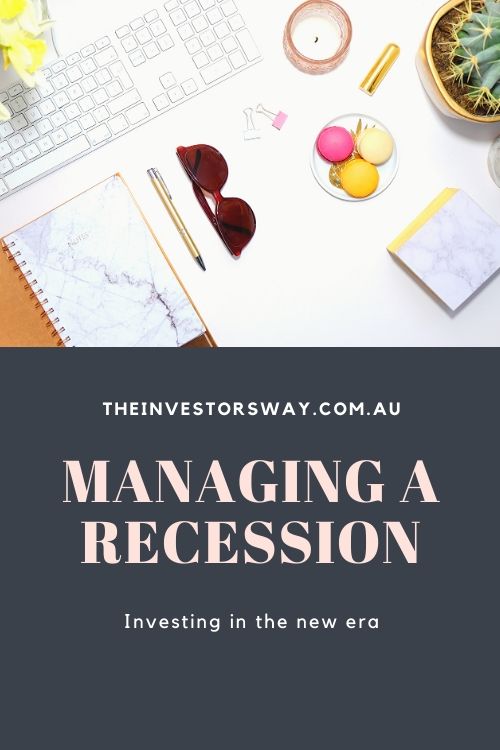Managing a recession is going to be a new concept for a lot of people, maybe you too.
No doubt by now, you are probably coming to the realisation that times have changed. There is a new normal, adjustments are going to be made to life as you knew it.
So, what does that mean for you and your investments? Let’s look at some of the things you should be contemplating as you manage your money over the coming weeks and months.

What is a Recession?
There are going to be a whole bunch of headlines in the coming months about a recession.
The next BIG topic for the media will be the economy and how you can be managing a recession. Trust me, the media is not where you want to take advice.
As you know, I recommend that you avoid mainstream media as much as possible. The hyperbole and hysteria they perpetuate will do no good for your mental state, especially now…
…and recession headlines are going to be the next hot topic. Fear-induced eyeballs on their content.
So, what is a recession? Well, as usual, there are multiple definitions just to make it confusing. However, the generally accepted definition is two consecutive quarters of negative economic growth.
A good chance that is going to occur given how close most economies were prior to the pandemic and how rampant inflation is across the world.
After having been told in recent times that we should be spending to help the economy, now we are being told we need to slow down to help reduce inflation. It’s little wonder people think Governments have no idea what they are doing.
For now, understand that this is going to dominate headlines and attempt to continue the fear dialogue for some time.
The Impact of a Recession
Now that you understand what a recession is, next, we need to know what it means practically and how managing a recession can lead to gains, not fear.
One thing I believe is that no matter whether we do or do not go into a recession, these times are going to be different. It’s the new normal thing.
Normally a recession means there are fewer jobs, less investment in infrastructure, and less economic activity, meaning more unemployment, more bankruptcies, and things are just harder.

As I have mentioned already, there has been a stack of Government money being poured into economies, and this could continue since no Government wants a recession. Unemployment in double digits hurts Government’s re-election aims and normally leads to higher interest rates, another thing that hurts re-election. Expect Governments around the world to do as much as they can to get economies back to the new normal as quickly as possible.
When it comes to the financial markets, it is normal to expect stock markets to stagnate. There is no business growth or profits to drive prices up, and there is no positive sentiment either.
Property markets, which also rely heavily on human emotion and confidence will also stagnate or fall. We certainly are seeing that now.
Which leaves cash-based investing, like Gold and Silver, Bonds, and Term Deposits. Normally Bonds and Term Deposits would benefit from increasing interest rates, however, it is less likely we will see that this time.
The precious metals could be the market that outperforms all the rest. A flight to safety in uncertain times. For as long as markets have been around, precious metals have been the safety investment. Since they are backed by physical gold or silver, investors believe there is more security. Now I’m not going to get into the merits of that argument, just acknowledge that this is what normally occurs and is starting to be reflected in prices now.
Another unknown at this time will be how the crypto markets perform during a recession. With no reference point, this will be a learning curve for everyone. Be wary of anyone telling you they know what they will do, because we just don’t.
Managing a Recession and Investing
The big question then is what your strategy should be in a recession environment. Obviously, your circumstances will depend on what you do, however, I want to start with the foundation of our strategy.
The foundation is to accumulate quality investment-grade assets on a consistent basis. The aim is to utilize the cash flows from these assets to first meet the investment costs and then to meet your living expenses.
So, what changes in a recession environment? NOTHING!
That’s right, your aim continues to be to accumulate investment-grade assets.
Sure, some markets are not going to be growing at rates you have seen for the last 10 or 20 years. However, quality assets are still going to be available, and quite possibly at much better prices than they were just a few months ago.
The most important part of this strategy is that they need to be investment-grade assets. Unlike the last 10 to 20 years when almost everything was going up in value, the next phase will require more prudent analysis.

Warren Buffett often uses the quote about when the tide goes out you can see who has been swimming naked. This is what is happening in markets now. So some consideration for the type of businesses that will do well in the new era is crucial to your success.
Potential for Life Defining Gains
I have mentioned a lot recently, on socials and in my programs, that these are the times when the wealthy tend to make some of their greatest returns.
While most people retreat and get caught up in fear, the wealthy are active. They are accumulating as much as they can.
What they know, is that when the markets turn, they will turn at a rapid rate and so they are buying at a discount to lock in huge gains over coming years.
Maintaining our strategy of accumulation will enable you to join the fun as well.
As I mentioned, stock markets and properties may be stagnated for a while, so start out looking at precious metals to take advantage of the flight to safety. Then, once you are comfortable with your allocation across the asset classes, you can start to accumulate stocks and property to take advantage of the discounts on offer.
In time you will be glad you did, and the hype about a recession will be just that, hype. You will have positioned yourself for great gains and potentially life-changing results.
